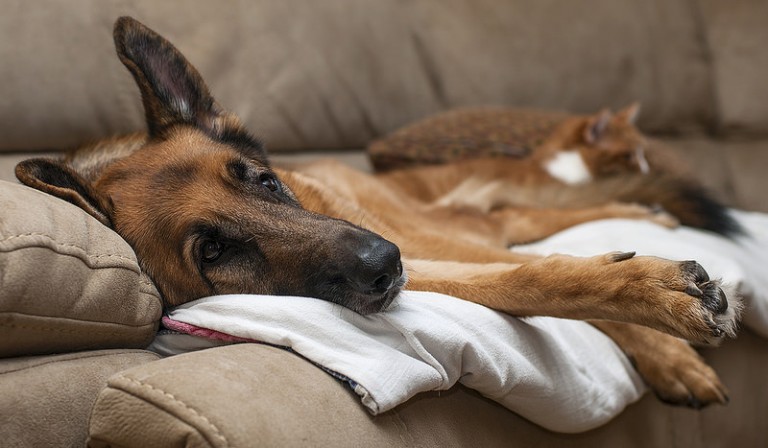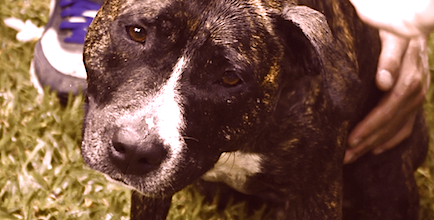5 Toxins You Should Never Make Your Pet Vomit
Certain toxins can do more damage coming up than they do going down. If your pet has swallowed something toxic, take her to the vet immediately.

Our dogs and cats eat the weirdest things.
You think you have the house secured — all toxins locked away, everything safe.
But sometimes we make a silly mistake and leave something out, or sometimes stuff just happens.
The basic treatment by veterinarians for toxic ingestion is:
- Induce vomiting or not, depending on the toxin ingested
- Absorb the toxin with something like activated charcoal
- Support the patient until the emergency is over with IV fluids, medications, etc.
Many people think that if their pet ingests a bad thing, the best way to help them is to make them vomit. I have had people call my clinic and say they gave hydrogen peroxide or even old-fashioned ipecac syrup at home.
This is not always a safe thing to do. Please do not try to make your pet vomit by using a toxic ingredient before checking with your vet.

Don’t leave your pet’s safety to chance
Sign up for Petful recall alerts today.

Your Vet Can Help
Always call your veterinarian, a local emergency hospital, or animal poison control if you think or know your pet has ingested something worrisome.
Dogs tend to eat the dumbest stuff. A little motor oil, cleaning supplies, detergents — even a battery.
Cats may often walk through something toxic but then clean themselves fastidiously, thus ingesting enough of a toxic substance to poison themselves.
5 Toxins You Should Never Make Your Pet Vomit
Here are the top 5 categories of commonly ingested products found around your home when, if ingested, vomiting is not recommended.
1. Household Cleaners and Cleansers
Many household cleaners, drain cleaners, toilet bowel cleaners, cleaners to remove rust or metal, etc., can be very toxic to pets. But inducing vomit is not indicated with these ingestions.
Bringing these corrosive ingredients back up through the esophagus can cause damage.
2. Batteries
Why would pets eat a battery? But they do. If you know your pet ingested a battery, take her to the vet as soon as possible.
Batteries also contain corrosive materials and, again, if leaked into the esophagus, they can cause irreversible damage.

3. Detergents
I wrote recently about those popular but dangerous laundry pods. These are convenient for us and green for the environment — but so, so dangerous to our pets.
If your pet eats a pod or other household cleaner, do not try to induce vomiting.
We treat these cases by giving water or milk for dilution and supportive care such as IV fluids, if necessary.
4. Miscellaneous Garage Items
The list is long, but we’re talking about kerosene, gasoline, motor oil, turpentine, stains, strippers, etc. These are called hydrocarbons.
Seek supportive care as soon as you know your buddy has snacked on something bad in the garage or the workroom.
5. Antidepressant Medications
by our furry friends is becoming more and more common.
To be honest, 1 or 2 pills are usually not an issue, but sometimes our crazy critters chew on a bottle and consume a toxic dose of medication. SSRIs, for example, a class of drugs frequently prescribed for humans and animals, can in excess.
Watch this video to learn more about toxic products that could harm your pet:

Often, the pet is sleepy or on the road to being comatose if they have taken an overdose of these drugs.
Trying to make them vomit the drug is not safe, however. Your pet could aspirate stomach contents, which could be a disaster. If a pet is not bright and alert and upright, do not make them vomit.
Act Quickly
If you are concerned that your pet has ingested or been exposed to a toxin and you can’t get in touch with your veterinarian, Animal Poison Control (888-426-4435) is a fantastic resource.
There is a charge for this service ($65), and it is extremely helpful if you know what your mischievous pet got into, how much the little furball may have ingested and the weight of your pet.
Of course, we don’t always know the answers to these questions, but try to do your detective work ASAP before calling the ASPCA poison hotline.
Now go check your garage and your basement, put your drugs away, place your batteries in a drawer and lock up your laundry pods in a tight container!
Reference
- Holowaychuk, Marie, DVM. “Top 5 Ingestions That Never Require Induction of Emesis.” Clinician’s Brief, October 2015, 13(10).








